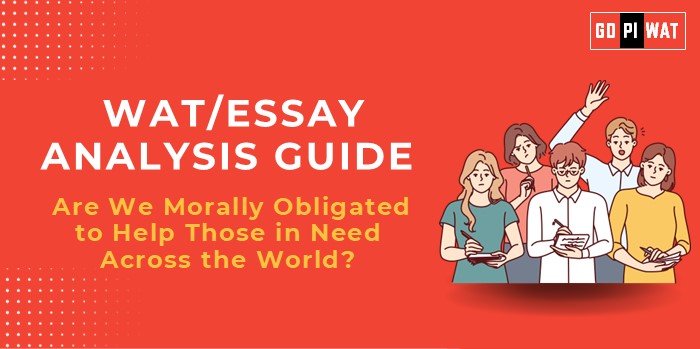📋 WAT/Essay Analysis Guide: Are We Morally Obligated to Help Those in Need Across the World?
🌐 Understanding the Topic’s Importance
This topic bridges ethics and economics, focusing on the moral imperatives of aid and its real-world implications, such as poverty alleviation, climate action, and global equity.
📝 Effective Planning and Writing
- ⏱️ Time Allocation:
- Planning: 5 minutes
- Writing: 20 minutes
- Review: 5 minutes
- 📚 Preparation Tips:
- Identify global challenges, key ethical frameworks, and successful international aid models.
💡 Introduction Techniques
- 🔀 Contrast: “In a world where the wealthiest 1% owns 46% of global wealth, over 700 million live on less than $2.15 a day—highlighting stark inequalities.”
- 🔧 Solution-Based: “Addressing global crises requires recognizing aid as not just charity but a pathway to shared prosperity.”
📂 Structuring the Essay Body
- ✨ Achievements: Discuss successes like reduced global poverty and life-saving vaccination campaigns.
- ⚠️ Challenges: Address issues like inefficiency and rising donor fatigue, supplemented by case studies.
- 🌅 Future Outlook: Highlight innovations like blockchain for transparent aid distribution.
📄 Concluding Effectively
- ⚖️ Balanced Perspective: “While global aid has made notable progress, achieving its full potential requires overcoming inefficiencies and fostering global unity.”
- 🌍 Global Comparison: “Learning from nations like Sweden and programs like the Marshall Plan can guide more effective global cooperation.”
✍️ Sample Short Essays
- ⚖️ Balanced Perspective:
“Global aid is an ethical necessity but must be restructured for efficiency to address growing crises effectively.” - 💡 Solution-Oriented:
“By integrating technology and private sector expertise, international aid can transition from a charity model to a sustainable development model.” - 🌍 Global Comparison:
“As Sweden allocates 1% of its GDP to aid, the world should follow suit, prioritizing global well-being alongside domestic progress.”


